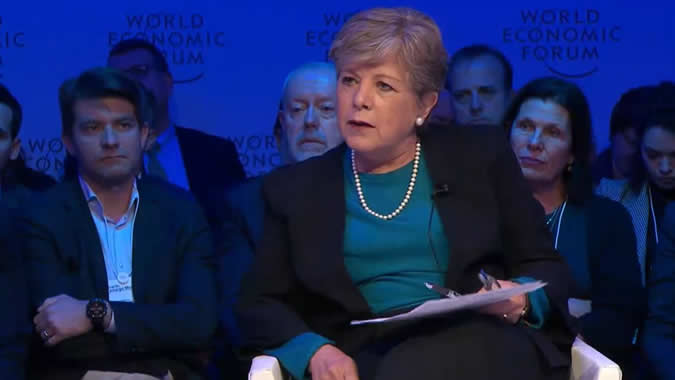Inequality is the Structural Cause of Social Unrest in Latin America and the Caribbean, Alicia Bárcena affirms at Davos Forum
The Executive Secretary of the United Nations regional organization participated this week in numerous sessions of the annual meeting of the World Economic Forum, the central theme of which was “Stakeholders for a Cohesive and Sustainable World.”

Inequality is the structural cause of social unrest in the region. For that reason, we need to move from a culture of privileges to a culture of equality and social inclusion, Alicia Bárcena, Executive Secretary of the Economic Commission for Latin America and the Caribbean (ECLAC), affirmed at the meeting of the World Economic Forum 2020, which concluded today in Davos, Switzerland.
The senior United Nations official participated throughout the week in numerous sessions of the global Forum, addressing the origins and persistence of inequality in the region’s countries as well as the impact that this, combined with low growth, has on development, innovation, inclusion and productivity. She also stressed the importance of public and private investment for bolstering productive diversification, infrastructure and regional integration.
“The protests in the region have a common thread, which is inequality, and they can become an opportunity for social change. In response to the demonstrations, we have seen how some governments have agreed to move ahead on structural improvements to essential public goods, such as health, education, pensions and transportation,” Alicia Bárcena sustained at the session entitled How to Turn Protest into Progress, held on Thursday, January 23, in Davos.
In addition to ECLAC’s Executive Secretary, the other participants on the panel included Craig Francourt, a Global Shaper from the Victoria Hub; Micah White, activist and co-creator of Occupy Wall Street; and William F. Browder, CEO of Hermitage Capital Management. The session was moderated by James Harding, co-founder and editor of Tortoise Media.
During her remarks, Bárcena noted that the social unrest in the region is manifested mainly among the youngest members of society, since expectations were created that have yet to be met.
Furthermore, she stressed the importance of respect for human rights and the right to protest, and she called for forging new social compacts with a view to guaranteeing the public good.
“Many countries do not contemplate the right to protest. At the United Nations, we defend human rights, equality, justice, and the voices of people who have no say,” she indicated.
ECLAC’s most senior representative also participated in a session entitled Latin America: Responding to New Expectations, where she emphasized that the enormous structural heterogeneity in the region acts as its great factory of inequality.
For that reason, she said, urgent progress must be made to build Welfare States, based on rights and on equality, that provide access to social protection and quality public goods, such as health and education, housing and transportation.
Alicia Bárcena also warned about the growth of middle-income strata in the region, which continue experiencing distinct shortfalls and vulnerabilities, both in terms of income and exercising their rights.
“76.8% of the region’s population belongs to lower and lower-middle strata, which live on income below three poverty lines,” she stated.
She specified that as of 2017, more than half of the adult population (52%) in middle-income strata had not completed 12 years of schooling, while 36.6% had occupations with a high risk of informality and precariousness. In addition, 44.7% of all economically active people in middle-income strata are not affiliated with or do not contribute to a pension system.
“There is an urgent need to move towards a culture of equality in the region through universal policies for social and labor inclusion that contribute to increasing human capacities, productivity and economic growth, while also establishing a culture of rights and of social citizenship,” she concluded.
The participation of ECLAC’s Executive Secretary in the World Economic Forum 2020 included a series of bilateral meetings and other public and private activities. During several of them, Alicia Bárcena addressed the scope of the Comprehensive Development Plan for El Salvador, Guatemala, Honduras and south-southeast Mexico, an innovative proposal that seeks to create a space for sustainable development by stimulating economic growth, promoting universal access to social rights, fostering resilience to climate change, and guaranteeing rights throughout the migratory cycle.
Related content

Inequality and Low Growth Team Up and Conspire Against Development, Innovation, Inclusion and Productivity: Alicia Bárcena
ECLAC’s Executive Secretary is participating this week in numerous sessions of the annual meeting of the World Economic Forum, being held in Davos, Switzerland.

Investment is Key for Bolstering Productive Diversification, Infrastructure, and Integration of the Region’s Countries
In the framework of her participation in the annual meeting of the World Economic Forum, Alicia Bárcena, ECLAC’s Executive Secretary, spoke at a session on the outlook for emerging markets in 2020,…
Country(ies)
- Latin America and the Caribbean
Contact
Public Information Unit
- prensa@cepal.org
- (56 2) 2210 2040